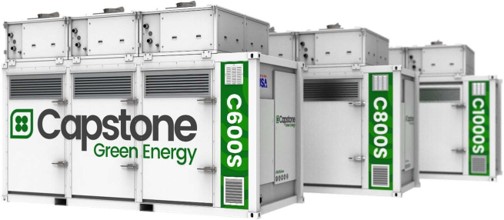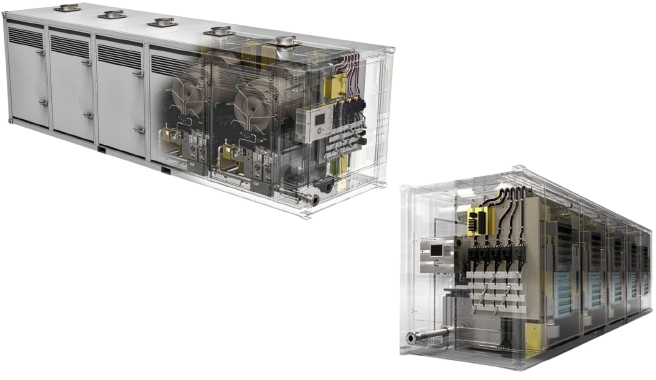التوربينات الدقيقة
Microturbines
HCH Group is dedicated to delivering advanced solutions aimed at reducing the carbon footprint, enhancing cost efficiencies, and bolstering resiliency in the business environment.
Recognizing the complexity of this challenge, the company has partnered with Capstone Green Energy to offer expert guidance to customers in the Egyptian market, leveraging cutting-edge technology and extensive experience in design, implementation, and management processes.
By comprehensively understanding the unique dynamics of the Egyptian market and its specific requirements, HCH Group Company is empowering customers to make a positive environmental impact while fulfilling their energy reliability and efficiency needs. This is accomplished through the utilization of products provided by Capstone Green Energy, a renowned global leader in Microturbine technology, enabling businesses to effectively manage their energy supplies.

Microturbine Technology:
Capstone Microturbines are highly efficient, compact gas turbines capable of producing electricity, with scalability ranging from 65kW to 10MW. Widely utilized for combined heat and power (CHP) as well as combined cooling, heating, and power (CCHP) applications, these turbines serve diverse industries and settings.
Microturbine Technology:
Capstone’s green energy solutions align perfectly with the needs of the oil and gas industry and are currently used in all phases of oil production including upstream, midstream, and downstream operations in both onshore and offshore applications. Capstone’s technology provides the low operational cost, high availability, and high-reliability oil producers need.

Microturbine Technology:
By integrating an aero-based turbine engine, a magnetic generator, advanced power electronics, with patented air bearing technology, Capstone microturbines are the ideal solution for today’s distributed energy needs.
Capstone Microturbines operate on a variety of fuels, including natural gas, associated gas, biogas and LPG/propane. In resource recovery applications, microturbines burn waste gases that would otherwise be flared or released directly into the atmosphere.
Here are some key points about Capstone Microturbines:
1. Microturbine Technology:
Capstone’s microturbines are small, high-efficiency turbines that generate electricity (Scalable from 65kW to 10MW). They are often used for combined heat and power (CHP) and combined cooling heat and power (CCHP) applications and can be employed in various industries and settings.
2. Applications:
Capstone’s microturbines find applications in a range of sectors, including commercial, industrial, and residential. They are suitable for providing power to buildings, data centers, hospitals, and other facilities.
3. Fuel Flexibility:
Capstone microturbines are designed to be fuel flexible, capable of running on a variety of fuels such as natural gas, propane, or biofuels. This flexibility allows users to choose the most economical or environmentally friendly fuel source for their needs.
4. High Efficiency:
Microturbines are known for their high efficiency in converting fuel into electricity. Capstone’s technology often includes advanced features such as recuperators and air-bearing systems to enhance efficiency.
5. Modularity:
Capstone’s systems are modular, allowing for scalability. Users can deploy a single microturbine unit or combine multiple units to meet the specific power requirements of a given application.
6. Environmental Benefits:
Microturbines are often considered environmentally friendly due to their low emissions and efficient use of fuel. They can contribute to reducing greenhouse gas emissions compared to traditional power generation methods.
7. Remote Monitoring and Control:
Capstone offers digital solutions for remote monitoring and control of their microturbine systems. This allows users to manage and optimize their power generation assets.

Applications:
The versatile microturbines offered by Capstone find applications across various sectors, encompassing commercial, industrial, and residential domains. They are ideally suited for delivering power to structures such as buildings, data centers, hospitals, and other facilities, demonstrating their adaptability and reliability in diverse operational contexts.
